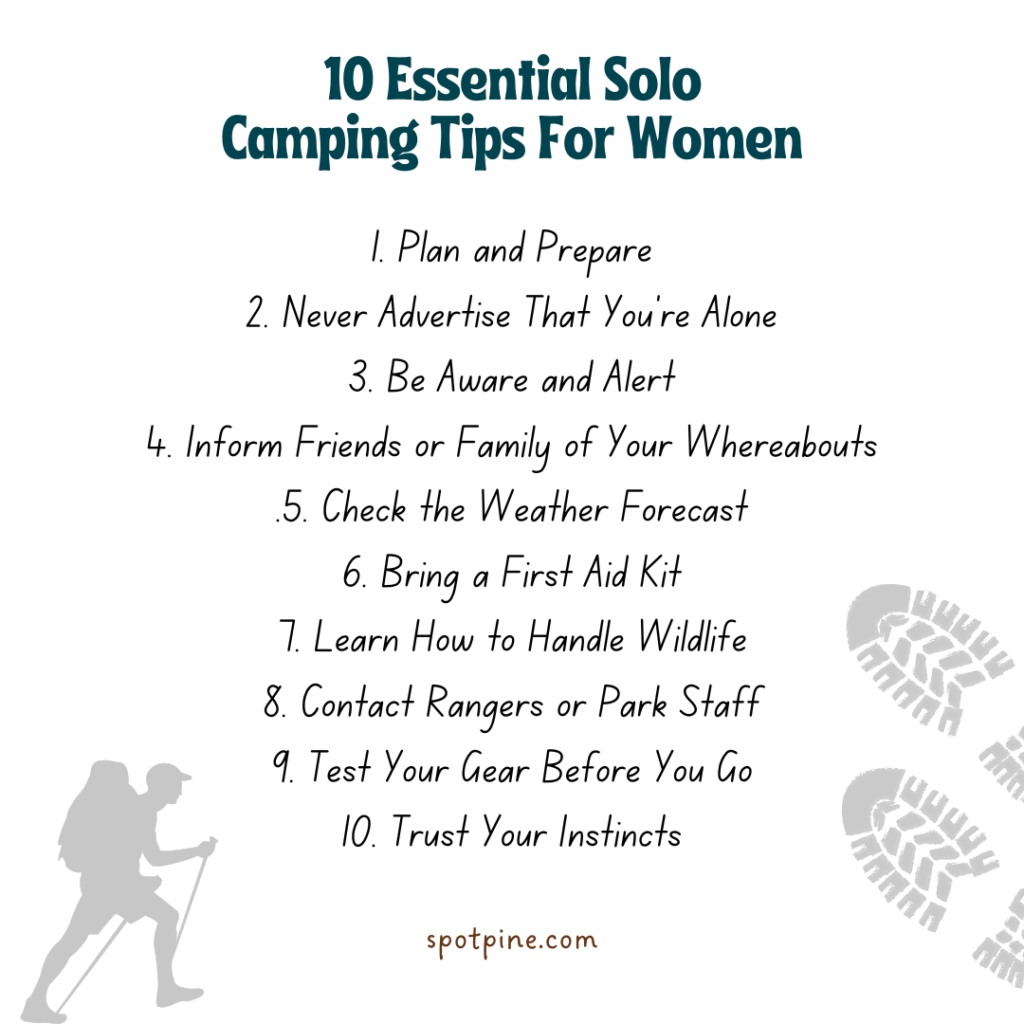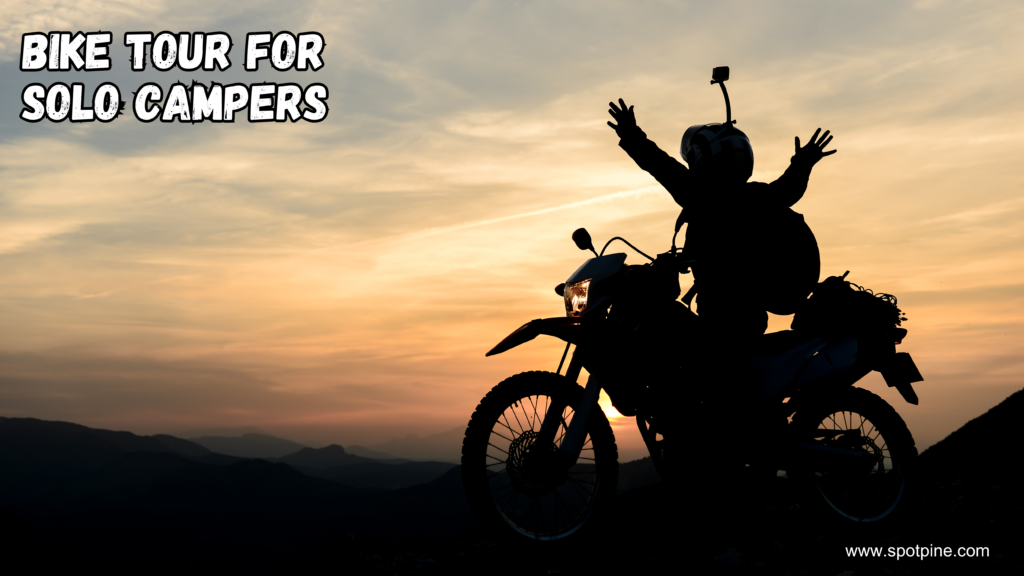Embarking on a solo camping adventure can be an incredibly rewarding experience for women, offering an opportunity for self-discovery, peace, and connection with nature. However, it’s essential to prioritize safety and preparation to ensure a successful trip. In this guide, we’ll explore ten essential tips that every woman should know before heading out alone into the wilderness. From planning and preparing for your trip to staying aware of your surroundings and handling wildlife encounters, these strategies will empower you to embrace the great outdoors with confidence. Whether you’re a seasoned camper or a first-time adventurer, these tips will help you create unforgettable memories while prioritizing your safety and well-being. So grab your gear, and let’s get ready for an empowering solo camping experience!
Camping alone as a woman can be an empowering and adventurous experience, allowing you to reconnect with nature, build confidence, and enjoy solitude. However, it’s essential to take safety precautions and plan ahead to ensure a successful solo camping trip. Whether you’re a seasoned camper or a first-timer, these solo camping tips will help you stay safe, prepared, and confident during your outdoor adventure.
Plan and Prepare for Your Solo Camping Adventure
Proper planning and preparation are key when embarking on a solo camping trip, especially for women. Start by researching your destination. Look into local regulations, weather conditions, and terrain to ensure you’re well-prepared. Whether you’re staying at a national park, a campground, or heading into the backcountry, knowing the specifics of the location helps you avoid surprises.
What to Plan for:
- Campground regulations: Check the rules regarding camping, fire safety, and wildlife protection. Some areas may require permits.
- Gear checklist: Make sure you pack essential items, including your tent, sleeping bag, cooking supplies, and clothing suited for the climate.
- Route details: Know how to reach your destination, and familiarize yourself with nearby landmarks.
- Emergency procedures: Have a plan for what to do in case of emergencies. Know the locations of nearby medical facilities and ranger stations.
Being well-prepared sets you up for a smooth and enjoyable trip.
Never Advertise That You’re Alone
One of the most important safety strategies for women solo camping is to avoid advertising that you’re alone. While it’s tempting to share your adventures on social media or with others you meet on the trail, doing so could make you a target for unwanted attention. Maintain a low profile and keep personal details to yourself.
Tips for Keeping a Low Profile:
- Keep campsite arrangements discreet: Choose a spot that’s not too visible from main paths or roads.
- Limit social media sharing: Share photos and details about your trip after you’ve returned home.
- Blend in: Dress and act like an experienced camper. Avoid looking lost or vulnerable.

Stay Aware and Alert at All Times
Being aware of your surroundings is crucial when camping alone. Keep an eye on your environment, whether you’re at your campsite or hiking. This awareness helps you avoid potentially dangerous situations, whether they involve wildlife, weather, or other people.
How to Stay Alert:
- Use all your senses: Pay attention to unusual sounds, sights, or smells. If something seems out of place, trust your instincts.
- Set up your tent smartly: Position your tent with a good view of your surroundings, but not too close to trail paths where passersby can see it easily.
- Keep valuables secured: Don’t leave your phone, wallet, or gear visible and easily accessible to strangers.
Inform Friends or Family of Your Whereabouts
Before heading out, inform a trusted friend or family member about your plans. This ensures that someone knows where you are in case of emergencies. Provide them with your itinerary, the name of the campground or trail, and when you expect to return. Regularly check in with them to keep them updated on your safety.
Essential Information to Share:
- Your camping location: Share exact coordinates or directions to your site.
- Duration of stay: Let them know how long you’ll be gone and when you plan to return.
- Emergency contact numbers: Include any local ranger stations or park authorities in your list of contacts.
Check the Weather Forecast
Checking the weather forecast is a crucial step in solo camping preparation. Be aware of temperature changes, rain, or severe weather alerts. The last thing you want is to be caught in a storm without the right gear.
Steps to Stay Prepared:
- Pack layers: Weather can be unpredictable, especially at night. Bring clothing for various temperatures.
- Check for wind warnings: High winds can make it difficult to set up camp or even cause damage to your gear.
- Rain preparedness: Bring a waterproof tent and pack covers. Be ready with tarps in case of rainstorms.
Bring a Well-Stocked First Aid Kit
A first aid kit is a must-have for any camping trip, but it’s even more important when you’re solo camping. You won’t have anyone nearby to assist if you get injured, so be sure to pack a kit that’s equipped to handle a variety of minor injuries and ailments.
What to Include in Your Kit:
- Bandages and gauze: For cuts and scrapes.
- Antiseptic wipes: To clean wounds.
- Pain relievers: Pack over-the-counter medications like ibuprofen or acetaminophen.
- Tweezers and safety pins: For removing splinters or ticks.
- Blister treatment: Prevent blisters from hiking with moleskin or other blister treatments.
Learn How to Handle Wildlife Encounters
If you’re camping in an area known for wildlife, it’s essential to know how to handle potential encounters. Wild animals are generally not a threat as long as you follow the right safety protocols, but unexpected encounters can happen.
Key Tips for Wildlife Safety:
- Store food properly: Use bear-proof containers or hang your food from a tree to keep animals away from your campsite.
- Know the animals in the area: Research common wildlife in the area, and learn how to react if you encounter them.
- Make noise when hiking: To avoid startling animals, make noise as you hike. This can help avoid surprise encounters with larger wildlife.
Contact Rangers or Park Staff for Assistance
Don’t hesitate to reach out to park rangers or staff for guidance or assistance. They are there to ensure your safety and can provide valuable information on trail conditions, wildlife reports, and campsite regulations.
Why You Should Contact Park Staff:
- Ask about trail conditions: Ensure trails are safe and accessible before setting out.
- Report any concerns: If you feel unsafe or notice something unusual, report it to the rangers immediately.
- Use their knowledge: Rangers can offer tips for staying safe and recommend areas to explore based on your skill level.
Test Your Gear Before You Go
Testing your camping gear before leaving is essential to avoid any surprises. Solo campers don’t have the luxury of relying on a group for extra equipment or supplies, so it’s important to ensure everything is in working order.
Gear to Test:
- Tent: Practice setting it up to ensure you can do it quickly and efficiently.
- Sleeping bag and pad: Test them for comfort and warmth.
- Cooking gear: Check that your stove works and pack enough fuel.
- Headlamp or flashlight: Ensure your lighting gear is fully functional with spare batteries.
Trust Your Instincts
Above all, trust your instincts when solo camping. If something doesn’t feel right, don’t hesitate to change your plans, move campsites, or even leave early. Your intuition is one of your best tools for staying safe in the wilderness.
Key Points to Remember:
- Listen to your gut: If a situation or person makes you uncomfortable, don’t ignore the feeling.
- Stay flexible: Plans can change, and it’s okay to adjust your itinerary if you need to.
- Don’t push your limits: Take it easy, especially if you’re new to solo camping.
Why Solo Camping Is Empowering
Solo camping can be a deeply rewarding and empowering experience for women. It provides the opportunity for personal growth, independence, and a connection to nature. By following these tips, women can safely enjoy the outdoors alone while building confidence in their skills and instincts.
What To Do When Camping Alone?
FAQs:
How To Camp Alone As A Woman?
Here are some tips for camping alone as a woman: 1. Plan and Prepare. 2. Never Advertise That You’re Alone. 3. Be Aware and Alert. 4. Inform Friends or Family of Your Whereabouts. 5. Check the Weather Forecast. 6. Bring a First Aid Kit. 7. Learn How To Handle Wildlife. 8. Contact Rangers or Park Staff. Remember, camping alone can be safe and empowering when you have the proper knowledge and skills. Stay prepared and be cautious. Happy camping!
Are Campgrounds Safe For Single Women?
Yes, campgrounds are safe for single women with the right knowledge and skills. It’s important to stay aware, be prepared, and never advertise being alone. Inform someone of your whereabouts and practice safety precautions.
What Should I Pack For Solo Camping?
When solo camping, pack essential gear: tent, sleeping bag, sleeping mat, stove set, headtorch, eye mask, ear plugs, hand sanitizer. Always prepare for safety and comfort in the outdoors.
How Do I Survive My First Camping Trip?
To survive your first camping trip, follow these tips: 1. Plan and prepare in advance. 2. Choose a campground near your location. 3. Keep your trip short initially. 4. Invest in essential camping gear. 5. Bring some home comforts with you. 6. Familiarize yourself with your gear beforehand. 7. Consider inviting experienced campers to join you. 8. Familiarize yourself with the campground rules.



Pingback: Solo Travel in Your 20s: Wanderlust Unleashed!